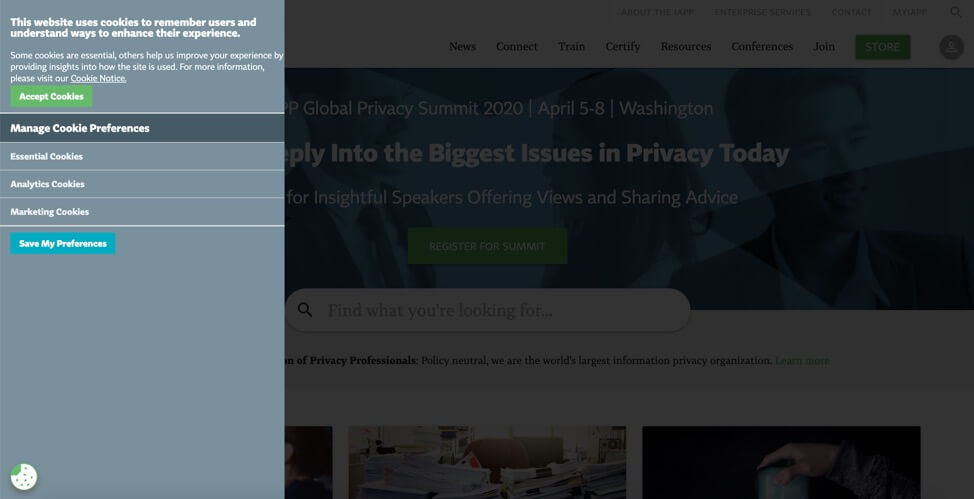How to Prepare for the Coming Cookie Disruption — 6 Steps to Take
Cookies, the little pieces of data websites collect from users, are becoming a lot less relevant due to recent events. Don’t be mistaken, though. The search for more data is at an all-time high and will continue to climb in the coming years. Cookies just aren’t one of the best ways to collect information anymore — at least not like they used to be.
Some claim the death of the third-party cookie is imminent because of new and upcoming changes. Referring to this new age in such a dramatic way is a little overkill. The cookie isn’t going anywhere, but it won’t be as reliable anymore.
The lack of reliability could lead to cookies becoming completely obsolete in the future, but they aren’t leaving us anytime soon. The largest and most recent hurdle for cookies is data policies.
Cookies and Privacy Laws
Data has become the primary tool for companies to stabilize themselves in the market and get ahead of the competition. With the economy fluctuating and businesses redirecting almost every part of our lives to the internet, trying to get people to buy products has never been more complicated. Discovering and directly contacting your audience has become a tricky endeavor. Some corporations have even gone a little too far in their search for information.
In 2016, the European Union passed the General Data Protection Regulation, or GDPR, which is the most significant data protection regulation announced so far.
The goal of the GDPR is to protect users’ privacy and make sure companies aren’t collecting and keeping personal details like email addresses and social security numbers. These protection laws exist all over the world, but the GDPR has made the most notable impact and is effectively ending the cookie’s digital presence.
Convert takes user data very seriously. We’re committed to adhering to GDPR regulations and adjusting our analytics application to be fully compliant with GDPR and the upcoming e-privacy regulations.
In the past year, we’ve made efforts to:
- Sign 10+ DPAs with third-party companies
- Remove 30% of our software stack for non-compliance
- Deleted 5000+ email addresses from our database for pre-GDPR non-consent
- Updated our forms across various channels to make them GDPR compliant
Cookies: Then and Now
Developers didn’t initially create cookies to collect as much input as possible. Cookies existed to ensure that the internet worked as intended. They first appeared in 1994 with the dawn of the first internet browser, Netscape. Netscape used cookies to preserve already submitted information, like login details. They made sure you didn’t have to log in again every time you went to a new page.
Even back then, the preservation types of cookies saved more information than login credentials. The amount of data collected grew until businesses were tracking how long a user stayed on their website, in addition to their physical whereabouts.
Gathering so much material has become a massive problem in recent years, as hackers have broken into companies’ websites, stealing sensitive information from millions of users. Now, lawmakers are taking steps to ensure the proverbial treasure vault is empty.
Controlling Your Own Data
Thanks to laws like the GDPR, companies all over the world must now be more transparent with their users. Many organizations have to give people complete control over their data, informing them of how their collection method works as soon as visitors arrive on their websites. After so many high-profile cases of hackers stealing information that people didn’t even know they’d given out, a lot of individuals don’t want anyone collecting their details at all.
In a turn of events, allowing people to choose whether or not businesses can collect their data is leading to the cookie’s downfall. Having more laws to protect users isn’t what anyone would call a bad thing, though. If they work effectively, companies can benefit from user privacy by implementing ways to change information acquisition as soon as possible.
Preparing for Cookies to Phase Out
First-party cookies used to personalize web experience likely aren’t going anywhere, anytime soon. Third-party cookies used for purposes like ad personalization, however, will be harder for companies to justify under new regulations and will likely be used much less frequently. Because of this unexpected technological turning point, many firms will have to apply other ways of managing data.
Here are six things that will have to change for companies to remain ahead of their competitors.
1. Provide More Transparency
An idea that can work well now — but not so much in the future — is not to phase out cookie use at all. Instead, being transparent about what information you’re taking and how you’ll use it can give users peace of mind about being on your website and relinquishing information.
The website of the International Association of Privacy Professionals, for example, prompts new visitors to accept cookies and features a visible cookie widget at the bottom left corner of every page. Using this widget, visitors can access information about how the IAPP is using cookies — what kind of information is being stored and how it is used — and adjust their cookie preferences. They can deactivate analytics and marketing cookies if desired.

2. New Advertising
With the ongoing downfall of third-party cookies, companies will have to use less information to get the same or better outcomes. Rather than advertising to a specific individual, it may be a lot easier to advertise to a group.
Once you figure out who your target demographic and current audience is, you can find people with similar interests and qualities to advertise to. Marketing segmentation can help with identifying your audience and targeting relevant groups.
3. Build a Marketing Strategy Based on First-Party Data
Marketers should prepare for the possibility that other internet marketing channels — like email marketing coupled with first-party cookies — that don’t rely on third-party cookies will become much more important and valuable.
Brands can get a head start on their competitors by encouraging users to create log-ins or share email addresses with your brand or website. This could be used as a foundation for new marketing strategies that replace ones that relied on data from third-party cookies.
4. More or Better Content
Websites that collect and sell user info using cookies rely on how much traffic they get. As a result, articles that have misleading or eye-catching headlines, a practice sometimes referred to as clickbait, have become popular among companies to get more views and collect valuable user data. However, this practice is often annoying to users.
To avoid falling into the clickbait stereotype, create articles and brand materials on current, compelling topics, and try to provide more high-quality content. That way, your traffic will stay heavy throughout the cookie disruption.
Your brand should also be prepared to ditch targeted ads that rely on third-party cookies. Instead, your website can serve ads that are related to the content and stop using cookies to collect data that will be passed on or sold to advertisers.
5. Start Collecting the Right Information Now
People don’t want companies to keep and lose their personal data. Anything from names to phone numbers to credit card numbers shouldn’t be stored as cookies — or anywhere else — for a company to manage as they please.
While laws are changing to keep these facts and figures deleted, you can stay ahead of the competition by not collecting it at all. Target the essential details you need, and leave everything else behind, creating less work for your company and fewer worries for your users.
6. Take Advantage of Mobile Devices
Most apps don’t collect data at all. Considering that many people use their phones or tablets to get online these days, many aren’t using the browsers that use cookies to harvest information. Your company will need new methods of data-saving that are either not browser-specific or that are specific only to apps.
Mobile apps that require log-in information — like a phone number or email — can be highly valuable to marketers. These log-ins can provide them with useful first-party information that can substitute for third-party cookies.
Preparing for the Future
Assuming current privacy trends hold, we can be almost certain about a few things. Shortly, the use of third-party cookies will be limited, and users will have more control over their data.
Many companies are already using different strategies depending on their business operations and region. What works best for you may not be the best idea for your competitor and vice versa.
However, businesses, websites and brand managers will likely need to prepare for an internet where it isn’t practical or possible to use third-party cookies in advertising. They will probably need to change ad and marketing strategies to center on first-party cookies and data collection.
How does the cookie disruption impact experiments through Convert?
Firstly, in our efforts to be GDPR compliant, we disabled third party cookies in 2018.
Secondly, when it comes to browsers’ anti-tracking and tracking prevention measures, we’ve started to adjust our use of cookies that track visitor experiments. For instance, to work around ITP updates, Convert asked customers to move the cookie creation process away from the browser.
We’re a privacy-oriented tool. In the best interest of our customers and their users alike, we are committed to continuously updating our tool to comply with new regulations and keep up with the coming cookie disruption.
Have questions about how you can become GDPR compliant and overcome cookie disruption?
Contact our team to learn more.
Written By
Kayla Matthews

Edited By
Carmen Apostu


